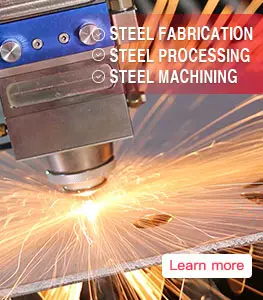Welcome to BBN Steel Materials Factory
EN10083-3 50CrMo4 1.7228 alloy steel plates hardness
EN10083-3 50CrMo4 1.7228 steel is a kind of alloy steel material. 50CrMo4 alloy steel has high strength and toughness, good hardenability, and good machinability. The chemical composition of 50CrMo4 alloy steel is:
- Carbon: 0.46-0.54%
- Silicon: 0.40% max
- Manganese: 0.50-0.80%
- Phosphorus: 0.025% max
- Sulfur: 0.035% max
- Chromium: 0.90-1.20%
- Molybdenum: 0.15-0.30%
The hardness of EN10083-3 50CrMo4 alloy steel plates ranges from 22 to 29 HRC (Rockwell hardness), depending on the heat treatment process. The common heat treatment processes for 50CrMo4 alloy steel plates are:
- Normalizing: The steel is heated to a temperature above the transformation temperature and then cooled in air. This process refines the grain size and homogenizes the microstructure, which improves the toughness and ductility of the steel. The hardness of the steel after normalizing is around 22-26 HRC.
- Annealing: The steel is heated to a temperature above the transformation temperature and then cooled slowly in the furnace. This process relieves the internal stress and restores the original microstructure, which improves the machinability and formability of the steel. The hardness of the steel after annealing is around 22-25 HRC.
- Quenching and tempering: The steel is heated to a temperature above the transformation temperature and then quenched in oil or water. This process forms a martensitic microstructure, which gives the steel high strength and hardness. The steel is then tempered by heating it to a lower temperature, which reduces the brittleness and improves the toughness of the steel. The hardness of the steel after quenching and tempering is around 27-29 HRC.
The hardness of 50CrMo4 alloy structural steel plates affects their mechanical properties, such as yield strength, tensile strength, and elongation. The higher the hardness, the higher the strength and the lower the elongation. Therefore, it is important to select the appropriate heat treatment process to achieve the desired mechanical properties.
In addition to the heat treatment process, the hardness of EN10083-3 50CrMo4 1.7228 alloy steel plates is also influenced by other factors, such as the cooling rate during quenching, the size of the plates, and the surface finish. The cooling rate during quenching affects the formation of the martensitic microstructure, which has a significant impact on the hardness. The size of the plates affects the heat dissipation during the heat treatment process, which can affect the final hardness. The surface finish affects the contact area between the plates and the cooling media during quenching, which can also affect the final hardness.
.webp)
.webp)
.webp)
.webp)
.webp)
.webp)
.webp)
.webp)
.webp)



Leave a Message